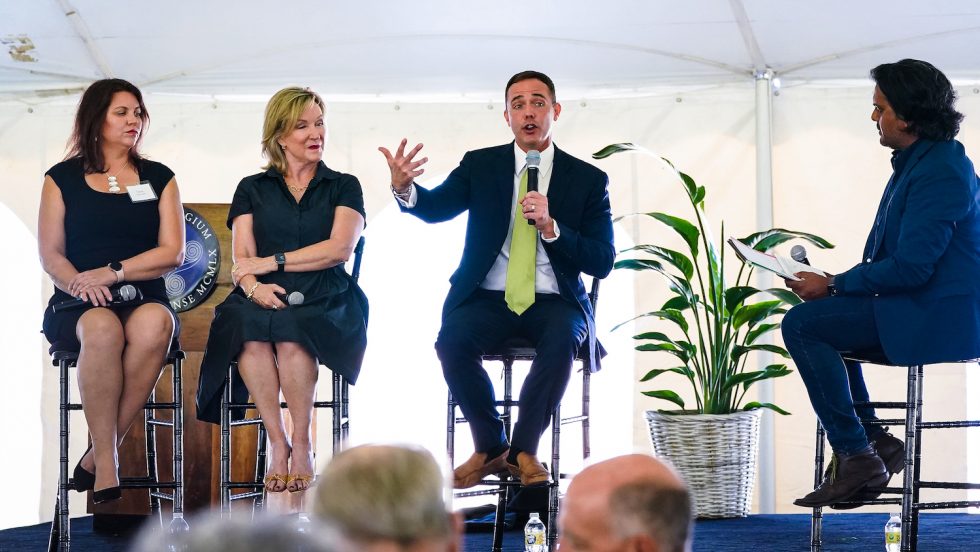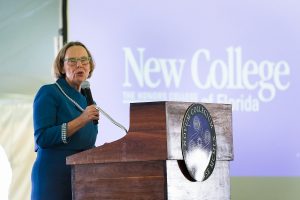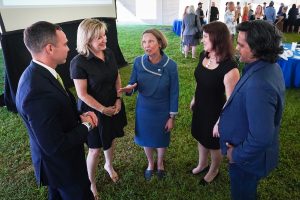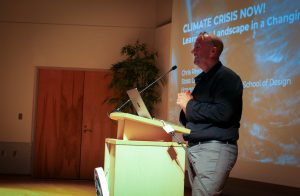“A Commitment to Resilience”: The New College Challenge Officially Launches

The event, hosted along the New College bayfront, was the launch of an initiative focused on coastal, economic and social resilience.
“I’m excited that you’ve joined us at this important moment for our college and our community as we begin a unifying year-long initiative to dream big and innovatively,” said New College President Patricia Okker, Ph.D., welcoming the crowd to a two-hour brunch event with lauded panelists and speakers.
The Challenge, Okker explained to the group, was designed to bring together students, experts and leaders from top universities and industries who will work to address the pressing challenges facing our region and our world today. The initiative was modeled after two endeavors in the Northeast: “Envision Resilience: Nantucket Challenge” and “Envision Resilience: Narragansett Bay.”
And the launch of The New College Challenge—with its series of community conversations about protecting coastal campuses and communities—could not have arrived at a more appropriate time. Less than a month ago, Southwest Florida experienced the devastating effects of Hurricane Ian, prompting locals to reimagine how to better safeguard against future environmental impacts.

“If ever there was a time to embrace new solutions, it is now. Whether through the unprecedented disruptions in the world of work, pressures on higher education, or the urgency of coastal resilience, this is no time for the status quo,” Okker said. “Our launch of The New College Challenge today is, at its heart, a commitment to resilience of all kinds and to the transformations necessary to achieve that resilience.”
Throughout the year-long Challenge, New College will become a community incubator for the big, bold ideas that Okker is championing. New College has already enlisted experts from Harvard, Yale, the University of Florida, the University of South Florida, Kean University, Syracuse University and the University of Miami to lend their unique perspectives to The Challenge team.
Additionally, the Tuesday event welcomed three expert panelists to discuss the topic of resilience, moderated by DreamLarge Founder Anand Pallegar.
The panelists were: Taryn Sabia, an associate professor of research at the University of South Florida and the co-founder of the urban design collaborative, Urban Charrette, Inc.; Teri Hansen, the president and CEO of Charles & Margery Barancik Foundation; and Kevin O’Farrell, Ph.D., the chancellor for the Florida Department of Education’s Division of Career and Adult Education.

“[The New College Challenge] is an opportunity for knowledge exchange,” Sabia said, to which Hanson added, “New College has the opportunity to be the academic and intellectual epicenter of our community.”
Special guest William Dudley, a New College alumnus and the former president/CEO of the Federal Reserve Bank of New York, also discussed the topic of “resilience” from an economic/financial perspective.
“My vision for the future of New College is one that continues our story of transformation,” Okker said, “to create the best environment for our students who have big, bold ideas, and who stand out to employers as the resilient problem solvers of tomorrow.”
And, as Dudley put it: “Let’s do the work and we’ll have a great future together.”
For more information on The New College Challenge and photos from this event, visit ncf.edu/challenge.
Watch The New College Challenge Tuesday event here: youtu.be/DwP_zR2KJtQ.
More free events will follow this week (RSVP here):
New Topics Lecture

Featured Speaker: Chris Reed, professor, Harvard University, founding director of STOSS Landscape Urbanism
A leading national voice in transforming landscapes and cities, Reed will share his ambitious vision to be climate-ready in order to protect our coastlines. Topic: “Climate Crisis Now! Learning and Landscapes in a Changing Environment.”
Designing for Resilience Symposium
Friday, Oct. 28, 8:30 a.m. to 4:30 p.m.:
A one-day symposium on coastal resilience and adaptive strategies. How can we design more resilient communities in the face of coastal threats like storm surge? Engage with national experts as they present case studies and research relevant to the Gulf Coast. Your questions and input will offer direction for their ongoing work in our community during the months to come.
Location: Tent on the bayfront
RSVP here
Livestream: youtube.com/watch?v=fST9KVqrN6c
President Okker’s October 25 Speech at The New College Challenge Kickoff:
I’m Pat Okker, president of New College of Florida. Welcome to our campus. I’m excited that you’ve joined us at this important moment for our college and our community as we begin a unifying year-long initiative to dream big and innovatively, and as we kick off The New College Challenge.
We are a community ready to take on the challenges of the future. Today, I want to share a story about transformation. It started in 1960 when New College began.
New College. Our purpose is built into our very name. As our founders put it, “New College was named for a purpose. It is not, and never will be, another college. It is, and will always remain the new college, seeking new solutions to new educational needs.”
If ever there was a time to embrace new solutions, it is now. Whether through the unprecedented disruptions in the world of work, pressures on higher education, or the urgency of coastal resilience, this is no time for the status quo. Our launch of The New College Challenge today is, at its heart, a commitment to resilience of all kinds and to the transformations necessary to achieve that resilience.
Our founders had a clear vision for their “New” college. They understood that academic excellence was their absolute foundation. But they also knew that attracting the best and the brightest minds was not enough. They wanted to nurture individuals who made a difference in the world, and so they designed a curriculum to achieve that.
I’ve been at New College just over a year and have talked with many people about what makes a New College graduate different. My favorite stories come from people who have hired New College graduates. One is from an employer who had been struggling with a complex issue in his organization. Frustrated, he gave the problem to a recent hire, a New College graduate, who, as he told me, “disappeared for a few days” (and then came back with a concise description of what the underlying issue was, research on how other organizations had solved similar problems, and a recommendation of the best course of action). He told me that this hire was still, years later, his best hire ever.
New College is and has always been a college committed to nurturing these transformational problem solvers who find solutions when others cannot. This is why we exist. And it’s why we do things differently here. It’s why we don’t assign grades and why we do encourage intellectual risk taking. It’s why our curriculum is challenging and why we require students to complete independent projects all four years. Our curriculum isn’t designed to sort students into arbitrary buckets but rather to give them the skills and confidence they need to tackle complex problems (even hard ones like coastal resilience).
And the proof is both right here under this tent and in our alumni throughout Florida and the nation. New College alumni are more often than not innovators who find opportunities where others see only challenges: scientists who have opened up new areas of research, artists and organizers who have led community development projects, government leaders who make a real difference in the communities they serve, entrepreneurs whose businesses have spawned entire new industries.
I’m incredibly honored to have with us today all five members of the President’s Advisory Council, who are serving as strategic advisers to The New College Challenge. Their backgrounds are varied, but each of them has led through transformations in finance, nonprofit, energy and pharmaceutical industries. They understand—and I dare say, cherish—the critical thinking that they developed in the liberal arts. And they see enormous opportunities for New College.
The reason for their optimism—and mine—is that the world needs problem solvers more than ever. Industries and communities throughout Florida and the nation are experiencing unprecedented disruptions. As an honors college, we will never provide huge numbers of graduates. But we can, and must, focus on preparing the kinds of transformational problem solvers and leaders required for our region and state to thrive.
New College is proud to be recognized as a top five public liberal arts college in the U.S. But, if we take seriously the kinds of transformations we are considering, New College can be recognized as one of the best national colleges of liberal arts and sciences overall (public or private). To realize that potential, however, we cannot simply follow the path our founders set before us. We have to have the courage and discipline to do things differently.
These transformations have already started here at New College. New College students are paired with professional career coaches even before they arrive on campus, our faculty integrate career outcomes into the curriculum, and we have a goal to provide an internship for every student at New College. This approach to career education and work-based learning has garnered national recognition and is resonating with prospective students and their families. It’s one of many reasons that our class of new students is up more than 30 percent over last year, at a time when enrollment across higher education is declining.
But we need to do more to ensure that this generation of New College students can become the transformational problem solvers of tomorrow. We need new partnerships with employers, our community and other academic institutions.
Becoming a top college of liberal arts and sciences in the nation is not just a story about New College. It is a story about transformation in higher education. The model of liberal arts colleges, dominated by private schools in the Northeast, is unsustainable and disconnected to the economic and demographic shifts taking place in our nation.
Florida is poised to become the tenth largest economy in the world by 2030. To achieve that, we need—and deserve—a top college of arts and sciences right here in Florida that nurtures resilient, transformational leaders. Right now, Florida students who want to attend a top-ranked college of arts and sciences are forced to go out of state for their education. New College can play a key role in retaining this top talent for our state.
The New College Challenge is our vehicle to get us there. The design teams we’ve invited will help us find new and fresh ways to improve our infrastructure, to ensure that our campus supports our students. The relationships with employers, community members and other academic institutions we are developing through The Challenge will ensure the very resilience of New College.
Hurricane Ian was a powerful reminder of the urgency of the transformations that must take place. The destruction has been devastating. But the signs of resilience are everywhere. The Sanibel Causeway is a prime example—cut in pieces by Hurricane Ian, it has already reopened.
The New College Challenge is our own path to resilience. Starting today with all of you over brunch, we’ll begin many community conversations so that our academic experts have meaningful input (your input). So, when they form interdisciplinary student teams for their Spring classes, they can focus on bold, viable concepts for New College.
Together, we will find solutions we can realize. My vision for the future of New College is one that continues our story of transformation, to create the best environment for our students who have big, bold ideas, and who stand out to employers as the resilient problem solvers of tomorrow.
